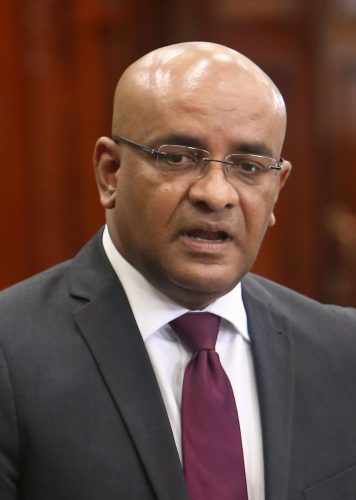
Bharrat Jagdeo
June 23 2018
The Caribbean Court of Justice (CCJ) has fixed next Tuesday for the delivery of the long-awaited final ruling on the constitutionality of the presidential term limit, which will determine whether former two-term president Bharrat Jagdeo can seek re-election.
The decision by the Trinidad-based final court has been greatly anticipated and is to be delivered before the retirement of CCJ President Sir Dennis Byron.
A decision upholding the ruling of the courts here, which have declared an amendment to the Constitution to prohibit presidential candidates from serving more than two terms to be unconstitutional, would most likely clear the way for Jagdeo to campaign for a third term.
The state had appealed decisions by both the Supreme Court and the Guyana Court of Appeal in favour of Cedric Richardson, a private citizen who in the run-up to the 2015 general elections had challenged restrictions created by amendments to Article 90 of the Constitution that were enacted in 2001 after the bipartisan Constitution reform process.
A decision in favour of the state, which is seeking to preserve the term-limit, is anticipated to deepen divisions in the opposition PPP/C over who should be the next candidate as there are disparate factions.
Jagdeo has distanced himself repeatedly from the case and has said that he has no interest in running for a third term. However, he is now the Opposition Leader and General Secretary of the PPP/C. It is that party’s General Secretary who has traditionally been its presidential nominee.
The PPP has also distanced itself from Richardson, who has kept himself away from any public scrutiny.
His argument had been that Act No 17 of 2001, which was passed by a two-third majority of all elected members of the National Assembly to effect the term-limits, “unconstitutionally curtails and restricts” his sovereign and democratic rights and freedom as a qualified elector “to elect the person of former president Bharrat Jagdeo” as executive president.
The amended Article 90 of the Constitution states at Clause 2(a) that a person elected as president after the year 2000 “is eligible for re-election only once” and at Clause (3) that a person who acceded to the presidency after the year 2000 and served therein on a single occasion for not less than such period as may be determined by the National Assembly “is eligible for election as president only once.”
On July 9th, 2015, the now retired Chief Justice (ag) Ian Chang had declared that the presidential term-limit was unconstitutional without the approval of the people through a referendum. In February, 2017, now retired Chancellor (ag) Carl Singh, and now retired Justice B S Roy had dismissed the state’s appeal of Justice Chang’s ruling. Dissenting was the now Chancellor (ag) Yonette Cummings-Edwards, who at the time was the acting Chief Justice.
The case was heard by the CCJ on March 12th, 2018.
In a more than six-hour long hearing before the CCJ, attorneys for the state had argued that amendments to effect the presidential term limit were done in accordance with the Constitution, even as those representing the challenger maintained that a referendum was required and that the two-term restriction was unlawful.
While Trinidadian Senior Counsel Douglas Mendes, appearing for Richardson, told the court that the amendments could only be effected via a referendum, Attorney General Basil Williams in his address had said that the change is done by the elected representatives of the people in the National Assembly.
The judgment will be handed down at 2 pm on Tuesday.
In a media release yesterday, the CCJ said the judgement will be live-streamed and the recordings will be posted on the CCJ’s website, www.ccj.org, within hours of the end of the hearing. Links to the broadcast and more information on the case and the others being heard by the court can be found under the Live Courtroom Broadcasts section of the site, it added.
Meanwhile, the release also noted that judgments will be delivered in two consolidated death penalty cases from Barbados.
The court will also hear a matter involving efforts to have a Belizean judge investigated, a Guyanese case in which a challenge has been made to a statute prohibiting men from cross dressing, and a case from Belize where a financial institution is seeking to have an award of US$4.46 million reinstated.
The Guyanese case pertains to the action brought by Quincy Mc Ewan, Seon Clarke, Joseph Fraser, and Seyon Persaud v The Attorney General of Guyana, where the appellants are challenging their highly-publicised convictions for the offence of being men who were wearing female attire in public for an “improper purpose.” This hearing is slated for 10 am on Thursday.
